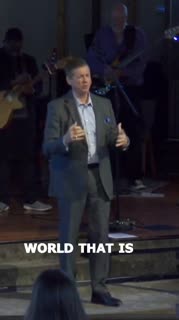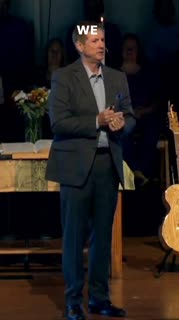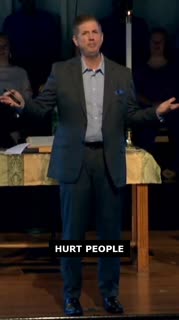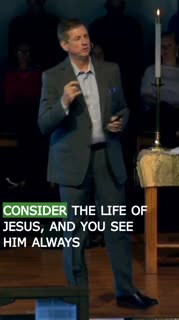Embracing Compassion: Lessons from Scripture and Life
Devotional
Sermon Summary
Bible Study Guide
Sermon Clips
1) "We live in a world that is broken. We live in a world that is very messed up, it's very divided, and just so many obstacles and things to overcome. And so, God, it's such a holy thing to be able to come together as the church, to worship you and to be reminded of our calling to be your disciples, to be able to, to spread this gospel of love and joy and healing and forgiveness. We're thankful that through the church, we discover opportunities in which we can serve, ways in which we can give, ways in which we can respond to bring your light into the world." [33:18] (41 seconds)
2) "Friends, not everything that is done in the name of the Lord is of the Lord. Amen. I mean, we know that. We see that all the time. And we see people in spiritual positions of authority who do things and do all sorts of abuse and do bad things in the name of the Lord. Just because it's been done in the name of the Lord doesn't mean that it's of the Lord. And just because this thing happened and Elijah performed it in the time, and I know it's within the context of the way the story goes down, it can be confusing. But I really believe it's more of a cautionary tale of how not to respond when, you know, when we've been wronged." [56:55] (46 seconds)
3) "We live in a broken world. There's a lot of harshness that goes on. But our response as we are followers of Jesus is not to respond with retribution, not to respond with anger and harshness, but to respond with love and understanding and compassion forgiveness. In the name of the Father, and of the Son, and of the Holy Spirit." [01:07:11] (31 seconds)
4) "Hurt people hurt people. And so we immediately, just like Elijah, when things happen, we want retribution. We want to lash back out. So how can we do better? Well, I'll give you a couple of ways. First of all, I think we have to realize that bullying is rooted in fear, insecurity, and hatred. Bullying is rooted in fear, insecurity, and hatred. Oftentimes, those who are bullying are actually very insecure people themselves, or they have some sort of hatred or they have some fear that's going on. On the other hand, the gospel, the gospel is rooted in love and grace and compassion and forgiveness." [01:04:02] (55 seconds)
5) "Consider the life of Jesus, and you see him always identifying and taking care of and standing up for those who were the least among us, those who were marginalized. It's where Jesus stood. It's where Jesus showed his care and his compassion. Apostle Paul in Romans says, do not overcome, do not overcome, I always say fear. Huh? There you go. Do not overcome evil with evil. Do not overcome evil with evil, but overcome evil with good, with love. And so we look to Jesus. How did Jesus respond when something like that happened to us? And we have examples. We can look at how Jesus did respond." [01:04:51] (58 seconds)
Ask a question about this sermon
2) "Friends, not everything that is done in the name of the Lord is of the Lord. Amen. I mean, we know that. We see that all the time. And we see people in spiritual positions of authority who do things and do all sorts of abuse and do bad things in the name of the Lord. Just because it's been done in the name of the Lord doesn't mean that it's of the Lord. And just because this thing happened and Elijah performed it in the time, and I know it's within the context of the way the story goes down, it can be confusing. But I really believe it's more of a cautionary tale of how not to respond when, you know, when we've been wronged." [56:55] (46 seconds)
3) "We live in a broken world. There's a lot of harshness that goes on. But our response as we are followers of Jesus is not to respond with retribution, not to respond with anger and harshness, but to respond with love and understanding and compassion forgiveness. In the name of the Father, and of the Son, and of the Holy Spirit." [01:07:11] (31 seconds)
4) "Hurt people hurt people. And so we immediately, just like Elijah, when things happen, we want retribution. We want to lash back out. So how can we do better? Well, I'll give you a couple of ways. First of all, I think we have to realize that bullying is rooted in fear, insecurity, and hatred. Bullying is rooted in fear, insecurity, and hatred. Oftentimes, those who are bullying are actually very insecure people themselves, or they have some sort of hatred or they have some fear that's going on. On the other hand, the gospel, the gospel is rooted in love and grace and compassion and forgiveness." [01:04:02] (55 seconds)
5) "Consider the life of Jesus, and you see him always identifying and taking care of and standing up for those who were the least among us, those who were marginalized. It's where Jesus stood. It's where Jesus showed his care and his compassion. Apostle Paul in Romans says, do not overcome, do not overcome, I always say fear. Huh? There you go. Do not overcome evil with evil. Do not overcome evil with evil, but overcome evil with good, with love. And so we look to Jesus. How did Jesus respond when something like that happened to us? And we have examples. We can look at how Jesus did respond." [01:04:51] (58 seconds)





